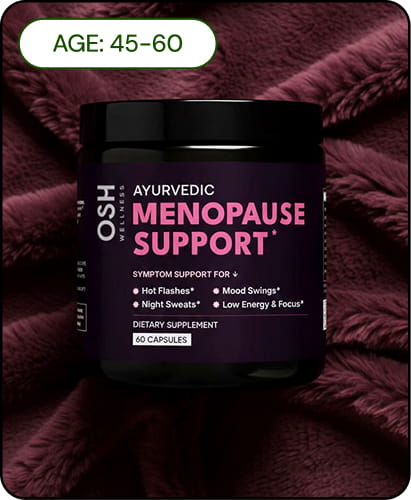Table of contents
Perimenopause is a significant transitional phase in a woman’s life, often beginning in the 30s and extending into the 40s. Marked by hormonal changes, it can bring about various emotional and physical symptoms that impact quality of life. Awareness and understanding of these early signs are crucial for managing perimenopause effectively. This article explores the importance of recognizing perimenopausal symptoms early and presents holistic, natural solutions tailored for women in this demographic.
Overview of Perimenopause and Its Significance

Perimenopause is the transitional phase leading to menopause, typically starting in a woman’s mid-40s but can begin earlier. It lasts on average four years, although it may span a few months to eight years. Characterized by pronounced hormonal shifts, this phase marks the end of reproductive viability, as levels of estrogen and progesterone fluctuate significantly in both frequency and intensity.
Estrogen levels decline inconsistently, resulting in irregular menstrual cycles and symptoms such as hot flashes, sleep disturbances, and mood swings. At the same time, progesterone levels drop due to sporadic ovulation, which causes missed or erratic periods. This hormonal imbalance can trigger anxiety and cognitive issues like memory lapses.
Beyond immediate symptoms, lower estrogen also increases the risk of osteoporosis and cardiovascular disease because estrogen supports bone health and heart function. Understanding these transitions is essential for symptom management and long-term wellness planning.
The Hormonal Transition During Perimenopause

Women experience intense hormonal fluctuations during perimenopause. Estrogen may vary significantly from month to month, rather than decline steadily. Ovarian function starts to diminish, creating inconsistent hormone production that contributes to the hallmark symptoms of this phase.
Meanwhile, progesterone levels drop early in perimenopause as ovulation becomes erratic. Shorter or skipped luteal phases mean less progesterone is produced, resulting in an unbalanced estrogen-progesterone ratio. This contributes to heightened emotional disturbances and physical discomfort.
Fluctuating hormones manifest through:
Hot flashes and night sweats
Vaginal dryness
These symptoms arise partly due to declining progesterone, which interacts with GABA receptors that regulate calmness and mood. Understanding these hormonal mechanisms is key to a holistic and empathetic approach to care.
Recognizing the Early Warning Signs

Perimenopause symptoms vary widely in presentation and intensity. One of the first noticeable signs is changes in menstrual patterns, including missed periods, heavier or lighter flow, and inconsistent cycle lengths. These irregularities are direct indicators of fluctuating hormone levels and herald the onset of perimenopause.
Other common early symptoms include:
Increased irritability or PMS-like symptoms
Cognitive difficulties like forgetfulness or difficulty concentrating
These psychological shifts can significantly impact daily life and emotional stability.
Physical symptoms often accompany emotional changes. These may include:
Hot flashes and night sweats
Insomnia or interrupted sleep
Vaginal dryness and urinary changes
While these effects may vary among individuals, early recognition allows for more effective symptom management.
Statistical Insights on Perimenopause

Recent research challenges the belief that perimenopause only affects women in their late 40s. In a large-scale survey of 4,432 women, more than 55% of women aged 30–35 reported experiencing moderate to severe symptoms linked to perimenopause. This rate increases to 64.3% among women aged 36–40.
Key findings include:
Common symptoms among younger women include fatigue, anxiety, and brain fog
Psychological signs often precede physical symptoms
A large percentage of women remain undiagnosed until their 50s
This delay in recognition stems from societal misconceptions about the age range for perimenopause, leading many women to dismiss symptoms or forgo early treatment. Raising awareness can significantly improve the lives of young women undergoing this natural transition.
Expert Perspectives and Recommendations

Healthcare professionals stress the importance of early detection and management of perimenopausal symptoms. Routine screening and public education initiatives are essential to help women navigate this life stage more healthily and informed.
Lifestyle and nutrition are key areas of focus in professional recommendations:
Consume a balanced diet rich in vegetables, whole grains, and calcium.
Include regular physical activity to improve mood and sleep..
Avoid processed foods, excessive alcohol, and caffeine
Doctors may also recommend various treatment options such as:
Hormonal therapies (e.g., low-dose birth control)
SSRIs and other mood-regulating medications
Natural supplements and integrative approaches
Open discussions between providers and patients enable women to make informed decisions about their treatment plans.
Ayurvedic and Natural Solutions to Manage Early Symptoms

Ayurvedic medicine offers a holistic route to managing perimenopause with time-tested herbs and practices. These remedies focus on restoring hormonal equilibrium and reducing distressing symptoms. For women, who want to avoid medical intervention and use of SSRIs due to associated side effects, Ayurveda provides a range of natural solutions.
Notable Ayurvedic herbs for perimenopause include:
Ashwagandha – combats stress and supports hormone regulation
Shatavari – nourishes the reproductive system and helps alleviate menstrual discomfort
Holy Basil – helps reduce fatigue, anxiety, and inflammation
Rhodiola rosea – reduces fatigue and improves sleep quality
Dietary and lifestyle suggestions from Ayurveda include:
Eating warm, cooked meals and using healthy fats like ghee
Limiting alcohol, caffeine, and processed foods for symptom control
Practicing Abhyanga (oil massage) to improve circulation and ease stress
These interventions support natural hormonal transitions and promote overall well-being.
Relevant Products
There is a growing selection of commercial menopause-support supplements leveraging these herbs. One example is Osh Wellness Menopause Support, which combines black cohosh, ashwagandha, and shatavari in clinically-informed dosages. Such products offer a convenient solution for those seeking natural relief from menopausal symptoms.
Conclusions

Recognizing the early signs of perimenopause is vital for women, particularly those in their 30s and early 40s. A comprehensive understanding of hormonal changes, expert guidance, and natural remedies empowers women to approach this life stage with confidence. Education, awareness, and proactive care pave the way for enhanced health and quality of life during the midlife transition.
FAQs
What are the most common symptoms of perimenopause in your 30s?
Irregular periods, mood swings, fatigue, anxiety, and brain fog.
How can I manage early symptoms of perimenopause naturally?
Through Ayurvedic herbs, proper diet, regular exercise, and stress management.
Is it possible to reverse perimenopausal symptoms?
While perimenopause is a natural process, symptoms can be minimized or managed effectively.
When should I consult a healthcare provider about my symptoms?
As soon as noticeable changes in your cycle or emotional health occur, particularly if they interfere with daily life.
Are there lifestyle changes that can alleviate perimenopausal discomfort?
Yes. Maintaining a healthy diet, reducing stress, getting sufficient sleep, and regular exercise all play major roles.








